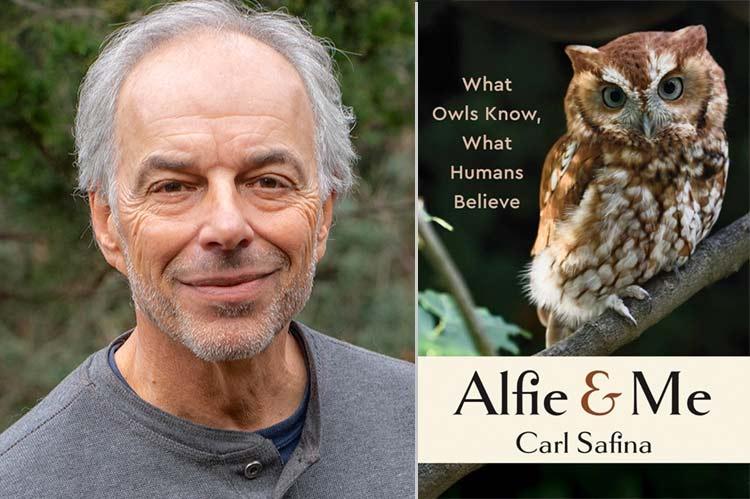“Alfie & Me”
Carl Safina
W.W. Norton, $32.50
"Alfie & Me: What Owls Know, What Humans Believe" sees the ecologist Carl Safina find an orphaned baby screech owl and help raise the bird to a normal, healthy life. It's a delightful book that reminds the reader to get outside, take the earbuds out, and listen to the soundtrack that nature offers.
As the book begins, Safina is texted a photo of a "barely living" baby bird "that looked like a wet washcloth," he writes. So banged up was the poor creature that he could not initially identify what kind of bird it was.
And so begins the relationship between Safina and Alfie, the owl's name inspired by none other than Alfalfa of "The Little Rascals," Safina deciding Alfie is a better name than Owlfie.
Based on Long Island, with the sea on one side and a nature preserve on the other, Safina, a professor of nature and humanity at Stony Brook University, is well situated to nurture a baby owl. He and wife, Patricia, have a veritable menagerie before Alfie arrives, including two dogs, four hens, a snake, and a few parrots.
"Pets become family because in some ways they are a bit better than us," he writes. "More peaceful, less manipulative, more forgiving, more eager to reconcile and smooth things over and move on. They show us how to be better than we are."
A broader array of wildlife traipses through the yard, including deer, raccoons, even a snapping turtle.
"Alfie & Me" takes place over a year. The pandemic strikes in the middle of that year, which means Safina is home more than he would normally be, not partaking in his usual lineup of speaking engagements, with more time to interact with Alfie.
They bond immediately, man and bird calling each other in the yard. "Whenever I saw or even thought of Alfie, I felt something between us that united us," Safina writes. "We did, after all, interact. We had a certain mutual understanding. To create a metaphor from physics, we had developed a covalent bond. And that was real enough to hold us."
As her health progresses and Alfie grows, Safina moves her from inside the house to an outdoor chicken coop. As her feathers grow out, she learns to fly. Safina holds his breath and watches.
The book is set up in a manner where it's a few paragraphs about Alfie's latest exploits, then a few paragraphs about how that relates to certain tenets of science, philosophy, and religion. Safina touches on Buddhism, Taoism, Shintoism, and Hinduism, and shares thoughts and findings from the likes of Plato, Aristotle, Epicurus, and Nietzsche.
Examining the role of God in nature, he writes, "From Zoroaster's Persia to Egypt to the eastern Mediterranean, voyagers, traders, and travelers exchanged everything from goods to alphabets to ideas about existence, influencing Greek philosophers and eventually — most importantly — Judaism, Christianity, and Islam."
The Alfie parts moved quickly, and I could not wait to see what happened next. The scholarly parts, on the other hand, required a different level of brain power, and were not nearly as fun to read. Nonetheless, Safina delivers these parts with writerly skill. Some felt like a college dissertation, but most did not. Either way, the reader comes away feeling slightly smarter than he was on the previous page.
Over time, Alfie finds a mate, who is dubbed Plus-One. Over more time, Alfie lays some eggs, which eventually hatch into a trio of owlets Safina dubs the Hoo. The first baby to try the flying thing is named Fledj. (Safina's knack for naming birds is good, not great.)
He watches Plus-One hunt, bringing chipmunks and mice back to the nest for his family to eat. The family grows.
Through it all, Safina worries for the owls' well-being. The perils they face are considerable, including bullying blue jays and outdoor cats that feed at the home of a neighbor and look to supplement these meals with a bird or two.
As much as Safina worries for the owls' health, the reader does too.
Though Alfie and her brood live in the trees, Safina feeds Alfie, leaving a frozen mouse in the yard, or simply holding one in his hand for Alfie to grab. He wrestles with his provider role, wondering if they are better off finding all of their own food, or if they will die without his contributions.
As the year winds down, the owlets are increasingly on their own. Alfie and Plus-One, quite literally, become empty nesters. Safina is sad to see less of them, but pleased to know they are functioning in the exurban wild.
The book is particularly timely with the recent death of Flaco, the owl who flew around New York City after he was surreptitiously freed from his Central Park Zoo enclosure. Safina wrote a New York Times op-ed, "Like Many a Hero, Flaco the Owl Made His Choice," in late February.
For a more detailed take on owls and what we can learn from them, there is "Alfie & Me." The book may inspire the reader to turn off the A.C. and open a window, or go for a walk, and listen a little better to what animals — even our own cats and dogs — might be telling us. It's an entertaining book, and one with valuable lessons to share.
Michael Malone, a native Long Islander, has written for The Philadelphia Inquirer and The New York Times.
Carl Safina, formerly of Amagansett, now lives in East Setauket.

